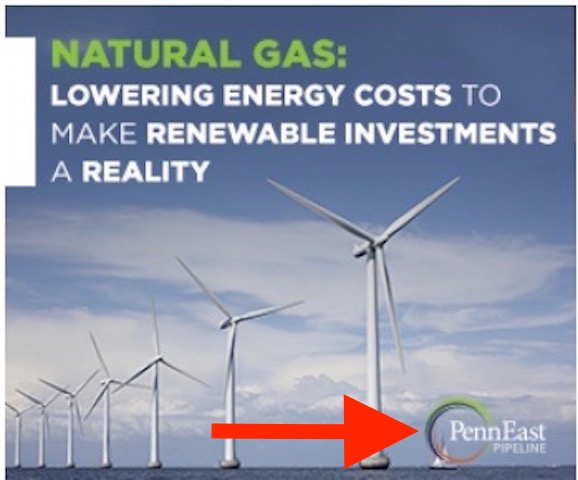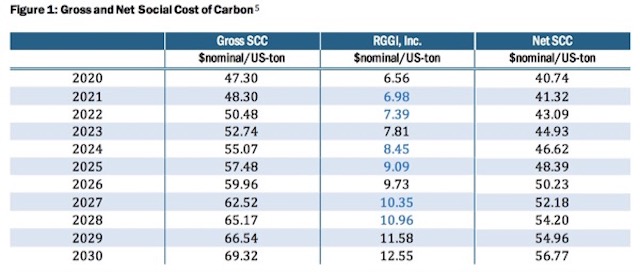Poor Issue Framing, Corporate PR, and Narrow Focus On Renewable Capacity Plays Right Into Their Hands
The press was protected [by the Constitution] so that it could bare the secrets of government and inform the people. Only a free and unrestrained press can effectively expose deception in government. ~~~ Supreme Court Justice Hugo Black, Concurring in New York Times Co. v. United States, 403 U.S. 713 (1971). (WiKi)
In a recent post, I wrote that Gov. Murphy’s energy and climate policies and 100% renewable energy transition – if actually implemented -were existential threats to the fossil gas and pipeline industries and would radically reduce the demand for gas. I accused South Jersey Gas of misleading investors, regulators, and the public, including by presenting unrealistic rosy scenarios about projected increases in demand for gas and associated corporate revenues and profits.
Not surprisingly, those industries disagree.
Check it out. These troubling claims are from a PennEast pipeline add today posted at revenue hungry NJ Spotlight:
Renewables are an important component of a diverse energy supply, but natural gas is needed to supply on-demand, clean back-up power to the electric grid when the sun isn’t shining and the wind isn’t blowing. …
While natural gas-fired capacity increases, renewable sources also will increase. As renewable power grows, natural gas is uniquely suited to serve as its foundation fuel. As there are varying amounts of sun and wind, based on the season and time of day, solar and wind power requires natural gas and other traditional fuels on standby as part of a reliable backup system. (For every kilowatt of renewable electricity, there must be a kilowatt of back-up.)
Linking fossil to renewables – to paraphrase my grandfather – takes big balls.
If they spin like this publicly, can you imagine what their lobbyists are saying to legislators and the Governor behind closed doors?
But PennEast’s claims are not only “game over for the climate”, they are plausible and politically realistic, particularly given the corrupt influence of the energy industry on State policymakers and the parallel need for those policy makers to defend their corrupt decisions with some plausible rationale and talking points that are so clearly and simply set out by PennEast.
That makes these PennEast arguments doubly dangerous, especially because they are going virtually un-rebutted by climate and environmental activists and media.
Unfortunately, many of the environmental cheerleaders for wind are playing right into their hands by focusing almost exclusively on increases in capacity of wind and solar, without making parallel demands by linking the transition to renewable to a radical restructuring of: 1) the electric grid 2) the current regulatory framework; 3) private corporate ownership and Wall Street investor control; 4) regulatory mandates that there is a 1-1 replacement of new renewables capacity for existing fossil a phase out timetable for existing fossil; and 5) a radical downward revision in economic growth expectations and our grossly unjust economy and unhealthy consumer and materialistic lifestyles.
It is beyond the scope of this note to lay this all out, but the simple points that must be linked and made part of the transition and renewable discussion are: 1) micro-grids and local distributed energy; 2) elimination of PJM control and the current BPU market driven energy deregulatory model which defends incumbent fossil generators and puts industry profits before the planet and needs of the people; 3) public ownership and democratic control; and 4) regulatory mandates to require renewables and phase out fossil, not just the current suite of voluntary market driven measures, incentives, and subsidies.
Public ownership is not a utopian or radical idea, it’s happening right now in California, which of course is a fact – just like the California nuclear phase out – that you will never read at NJ Spotlight, see:
Blocked by an effective energy industry political veto, even mainstream modest incremental reform policy options available under current law are being totally ignored in NJ, like putting a price on carbon to reflect climate impacts (aka “social cost of carbon” – a non-regulatory market based tool I do not support – e.g. see Exxon’s version of a carbon tax) are being discussed in New York:
NYISO’s Carbon Pricing Proposal: The Essence
NYISO’s proposal would incorporate a carbon price in the NYISO- administered wholesale energy markets, in dollars per ton of CO2emissions resulting from power plant operations. The carbon price would be based on the social cost of carbon emissions, established by New York State officials. …
The carbon charge would provide incentives to suppliers of power with low or no carbon emissions, including for innovative low- carbon technologies that may not yet be developed or be commercial in wholesale markets that do not provide compensation for the value those resources provide. Imports of power into New York would have a carbon adder, thus discouraging leakage of CO2emissions into neighboring regions.
While we desperately need to reframe and broaden the discussion, we won’t get any of those arguments from corporate PR firms that the electric vehicle, wind, and anti-PennEast pipeline activists are relying on (see their private individual, voluntary, consumption reinforcing, “stronger”, pro-corporate elite, market based, consumer “choice” framing that IGNORES THE CLIMATE CRISIS):
Bernie Sanders’ Green New Deal Climate Crisis Plan establishes the national policy framework.
See Dave Roberts’ recent superb over-view of these issues:
And Chris Hedges lays out the activist and political strategy, see:
Have at it, but ignore the PennEast arguments and talking points at your peril.
[End Note: It is remarkable that NJ Spotlight continues to accept misleading and false by omission fossil energy advertisements.
Do they need the money that bad? Have they no journalistic standards?
As I’ve written, has no one learned from the NY State lawsuit against Exxon for lying about climate crisis?
After four years of legal sparring and finger-pointing, oil-industry giant Exxon Mobil went to court on Tuesday to face charges that the company lied to shareholders and to the public about the costs and consequences of climate change.
The case turns on the claim that Exxon kept a secret set of financial books that seriously underestimated the costs of potential climate change regulation while claiming publicly that it was taking such factors into account. It follows a sprawling investigation that included millions of pages of documents and allegations of a chief executive’s secret email account.
Did the NY Times contribute to these lies by giving the oil industry a quarter of the Op-Ed page to spew those lies?
Did the NY Times contribute to these lies by failing to report the science in a way that directly confronted and exposed the lies that they were allowing to be printed in their own paper? By printing scores of “he said/she said” stories that gave these false claims legitimacy?
Would the NY Times print these lies today?
The questions answer themselves.
So, with this context in mind, I was beyond disgusted yesterday to read “sponsored content” in NJ Spotlight by the same pack of corporate oil and gas industry liars, operating as a dark money propaganda front group purported to protect consumers and families,




Pingback: WolfeNotes.com » The Cap Is Full Of Crap – And So Are Gov. Murphy’s Trenton Cheerleaders
Pingback: WolfeNotes.com » Jim Hansen Calls Out Climate Impacts Of Biden’s “Inflation Reduction Act” Deal